
Yandex LLC is a Russian technology company that provides Internet-related products and services including a web browser, search engine, cloud computing, web mapping, online food ordering, streaming media, online shopping, and a ridesharing company.

Russian Post is an Aktsionernoye Obschestvo which is the national postal operator of Russia. The company is responsible for the delivery of mail in Russia, and the issuing of postage stamps. Russian Post employs about 390,000 people and has over 42,000 post offices, with its headquarters in Moscow. In 2012 the Russian Post delivered more than 2.4 billion pieces of mail and accounted for more than 54 million parcels and more than 100 million in remittances. In March 2013 a presidential decree signed by President Vladimir Putin included the Russian Post in a list of so-called strategic enterprises.
Interfax is a Russian news agency. The agency is owned by Interfax News Agency joint-stock company and is headquartered in Moscow.
Mechel is one of Russia's mining and metals companies, comprising producers of coal, iron ore in concentrate, steel, rolled steel products. Headquartered in Moscow, it sells its products in Russia and overseas, and is formally known as Public Joint Stock Company Mechel.
PJSC Polyus is a Russian gold mining company. It is the largest gold producer in Russia and one of the top 10 gold mining companies globally by output. It is headquartered in Moscow and is listed on both the Moscow and London Stock Exchanges. Polyus’ main assets are located in Eastern Siberia and the Russian Far East - in the regions of Krasnoyarsk Krai, Irkutsk Oblast, Magadan Oblast and the Republic of Sakha.

AFK Sistema PAO is a large Russian conglomerate company, founded by Vladimir Yevtushenkov, who was chairman of the corporation's board of directors until 2022. In April, Yevtushenkov's shareholding in Sistema has decreased to 49.2%, and he also stepped down from Sistema's board.
YOOX Net-a-Porter Group S.p.A. is an Italian online fashion retailer created on 5 October 2015 after the merger between Yoox Group and Net-a-porter Group (NAP).

Techstars is a global startup accelerator and venture capital firm founded in 2006 and headquartered in New York City. The accelerator provides capital, mentorship, and other support for early-stage entrepreneurs.

Baring Vostok Capital Partners is the largest independent private equity firm focused on investments in Russia and the Commonwealth of Independent States. The Baring Vostok Private Equity Funds invest across a broad range of industries including oil and gas, consumer products, media and technology, telecommunications and financial services.
X5 Group is Russia's largest food retailer. In 2012, the organization of X5-Retail Group LLC was liquidated, and in 2018 X5 Group LLC was opened.

t2 is a Russian telecommunications company originally founded by Swedish Tele2. It has been operating since 2003. Since 2020, Tele2 Russia is a wholly owned subsidiary of Rostelecom. At year-end 2019, Tele2 Russia provides wireless services to more than 44.6 million subscribers.

Maëlle Gavet is a French businesswoman, author, and entrepreneur.

QIWI plc was a Russian company that provides payment and financial services in Russia and CIS countries. The group includes QIWI payment system, QIWI Bank, CONTACT money transfer system, Factoring PLUS, Flocktory, and RealWeb. The company has representative offices in three countries.
Zen is a personal recommender system that uses machine learning technology.
Yandex Market is a Russian free online service for the selection of goods and shopping. The service was launched on November 30, 2000 by Yandex. Since 2016, it is a separate company.
Doc+ is a Russian medical company that provides services in the field of telemedicine, requesting a house call by a doctor, storing and processing personal medical data. It was launched in September 2015. It works in Moscow, Moscow region, and St. Petersburg.
Wildberries is the largest Russian online retailer. It was founded in 2004 by Tatyana Kim.

Michael Calvey is an American businessman and was one of Russia's most prominent foreign investors. His controversial Russian criminal conviction on embezzlement and the subsequent nullification of the case was widely publicized in Russia and the world.

Leonid Boguslavsky is a USSR-born Canadian entrepreneur, scientist and venture capital investor. He was named the Internet investor of the year and the most successful investor of the year. He is the founder of RTP Global, a venture capital firm with offices in New York, London, Paris, Bangalore and Dubai. He was one of the first investors in companies such as Datadog or Delivery Hero. Boguslavsky is in Forbes' billionaires list. His wealth is self-made from venture capital investments with more than 99% created outside of Russia. He is widely considered one of the most successful technology investors. In the global Forbes 2023 ranking, he occupied the 787th place with a fortune of $8.6 billion.
Samokat is a Russian dark store rapid delivery service for food and household goods. Founded in 2017, it was the first dark store operator in the country. By 2022, Samokat owned around 1,100 dark stores in 49 cities and handled 35% of dark store deliveries Russia-wide.









